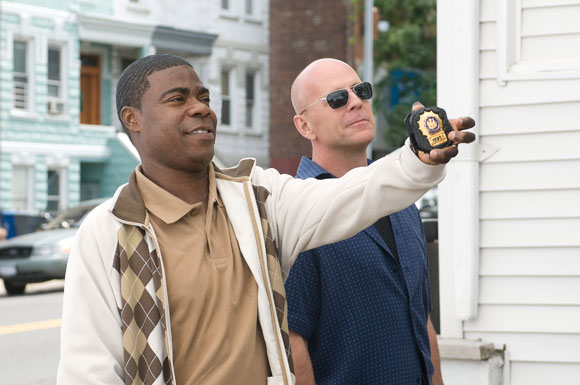Cop Out

Jimmy Monroe (Bruce Willis) and Paul Hodges (Tracy Morgan) begin with the mandatory, Glover-Gibson opening about age. They’ve been working together for nine years and, just like the infamous duo in Richard Donner’s template for the buddy-cop action/comedy, they beat that point to death. As is customary, they report to the Constantly Disappointed Captain (Sean Cullens) who ends up taking their badges, only to be badgered by two inferior detectives, Hunsaker (Kevin Pollak) and Mangold (Adam Brody)—both obviously named from birth to one day be “Detectives Hunsaker and Mangold.”
Jimmy’s wife left him for a much wealthier, irritating man played, appropriately, by Jason Lee. Also, Paul has hit the paranoid stage with his wife, Debbie (Rashida Jones). He goes to the length of installing a nanny-cam (disguised as a teddy bear) to monitor the bedroom while he’s away on stakeouts, including the opening one which has him in a foam cell phone costume trying to nab a guy fencing stolen goods. The bust goes awry, and the criminal gets away.
In the meantime, Poh Boy (Guillermo Diaz), a walking sight gag (also a deranged gangster) has stolen an electronic key with a list of accounts worth millions of dollars. Thought: If you can bully people and have no regard for the law, the limit seems to be your imagination… no? Instead of simply using seemingly unlimited criminal resources, Poh Boy keeps the girl whose rosary carries the data. As far as I can tell, he doesn’t really need the girl unless he can see into the future and realize that he’s going to need a hostage during an avoidable confrontation that has yet to occur.
Then we circle back to the two protagonists. Jimmy’s saddled with the prospect of a $50,000 wedding for his daughter Ava (Michelle Trachtenberg). His pride won’t allow Roy, her stepfather, to foot the bill. So he attempts to sell a prized baseball card worth more than enough. Just then, two thieves rob the collectibles store, led by a cat-burglar type named Dave (Seann William Scott doing his very best to annoy the living hell out of you). Guess who the thieves sell the card to?
I’m unsure if this hackneyed film is worth dissecting its lapses of logic, such as the oddity of Jimmy’s wife being so shallow as to marry another man for financial security. Who of that materialistic frame of mind marries a police officer to begin with? And what paranoid person doesn’t watch the entire surveillance tape to see the face of the man his wife is allegedly cheating with? Doesn’t it constitute cinematic bigotry when Jimmy mocks Paul’s “bad cop” routine of endless movie quotes ranging from Scarface to Robocop, only to later have the principal villain reference a scene from Clear and Present Danger in which, while practicing with a batting machine, Ernesto Escobedo (Miguel Sandoval) beats the hell out of an unreliable spy with a baseball bat? I liked this scene even better in Get Shorty, when Mr. Sandoval kills an unreliable courier, but not before smugly pondering a visit to the Miami Vice Action Spectacular at Universal Studios.
Naturally, because director Kevin Smith wants to some day grow up to be Quentin Tarantino, himself a plagiarist who wants to grow up to some day be a filmmaker, he has very consciously employed the talents of composer Harold Faltermeyer to insert murmurs of his scores for the quintessential 80’s cop comedies, Beverly Hills Cop and Fletch. Does it have the intended effect of making us feel like we’re following Irwin Fletcher or Axel Foley on another adventure? I think it does the opposite, making us long for those films—tighter direction and storytelling in the hands of equally gifted comedic actors in their prime.
If there’s any reason that Cop Out can be regarded as at all palatable it’s the comic timing of Mr. Willis and Mr. Morgan, and Mr. Scott to a lesser extent. Mr. Morgan’s absurdist wit plays well against Mr. Willis’ deadpan timing. And, while Mr. Scott’s copycat routine—repeating another person’s every word—is instantly grating, dragging it out oddly makes it more difficult to avoid laughing.
The story, by contrast, is an absolute mess. I’m convinced that Mr. Smith has the ability to create humorous sketches and slap them together in a collage-style film, a series of mini-shorts. But he doesn’t seem to yet grasp how to structure, pace and edit a continuous, rational narrative. I’m not saying that the behaviors of individual characters have to be logical. That’s especially unwise when dealing with the improvisational eccentricity of Mr. Morgan—e.g. pointing to his head, he describes Dave’s relentless attempts at bonding as, “Tryin’ to live here rent free.” But there has to be connective tissue from scene to scene, not just disconnected moments with the occasional zinger. There are better films for both Mr. Willis and Mr. Morgan to inhabit with their comedic talents.
 Cop Out • Dolby® Digital surround sound in select theatres • Aspect Ratio: 2.39:1 • Running Time: 107 minutes • MPAA Rating: R for pervasive language including sexual references, violence and brief sexuality. • Distributed by Warner Bros. Pictures
Cop Out • Dolby® Digital surround sound in select theatres • Aspect Ratio: 2.39:1 • Running Time: 107 minutes • MPAA Rating: R for pervasive language including sexual references, violence and brief sexuality. • Distributed by Warner Bros. Pictures